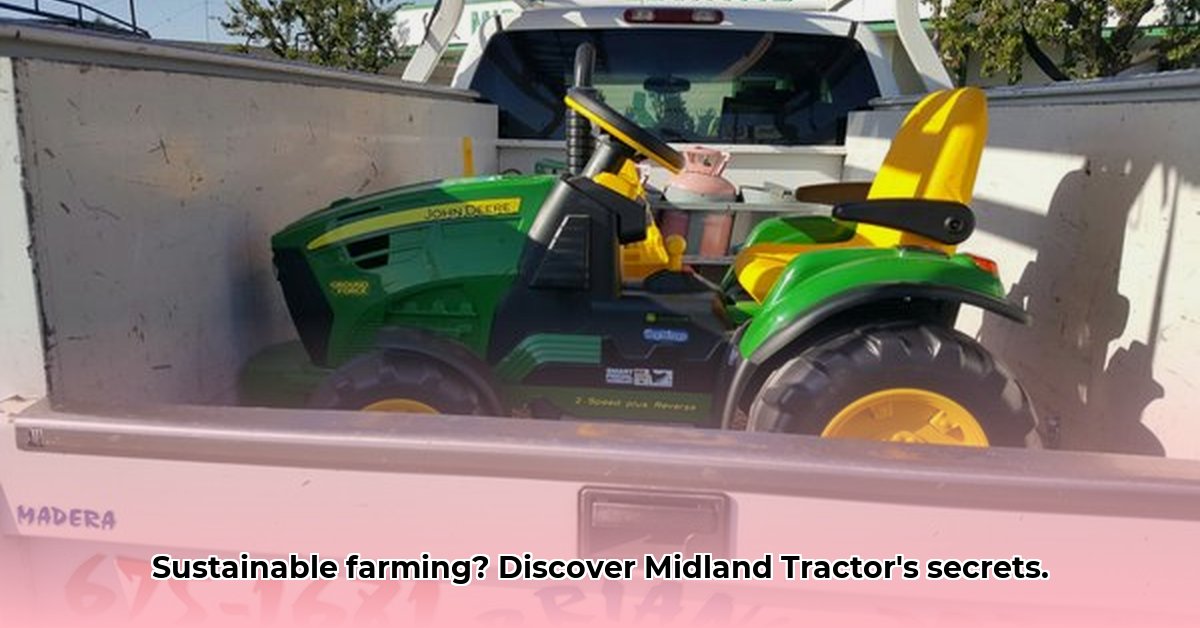
Midland Tractor Co., a cornerstone of Madera, California's agricultural landscape for over four decades, presents a compelling case study in adapting to evolving industry needs and the growing emphasis on sustainable practices. This article analyzes Midland Tractor's history, current operations, and potential for future growth within a rapidly changing agricultural sector. The analysis focuses on their market position, sustainability initiatives, operational efficiency, and customer relationships, highlighting areas for further development. For similar companies, check out Fresno Tractor.
A Legacy of Service and Innovation
Midland Tractor's enduring success stems from its commitment to providing comprehensive solutions to local farmers. Their longevity reflects an ability to adapt to fluctuating market conditions and technological advancements. This isn't simply about selling equipment; it's about forging relationships built on understanding the complexities of farming in the Central Valley.
Comprehensive Equipment and Services
Midland Tractor offers a diverse range of agricultural machinery, ensuring suitability for various farm sizes and crop types. Their inventory includes tractors, harvesters, and irrigation systems, among other essential equipment. But their service extends beyond sales. The company's innovative parts drop-box system, strategically located throughout the region, minimizes downtime for farmers, a critical factor in maximizing harvest yields. This efficient system directly contributes to their operational success and customer satisfaction. How does this efficient parts system impact overall farm productivity? Further quantitative analysis could provide a definitive answer.
Sustainability: An Area for Growth
While Midland Tractor's history demonstrates resilience, a full assessment of their sustainability practices requires further investigation. While the company has not publicly released detailed sustainability data, there is significant potential for growth in this area. A key question is: How can Midland Tractor leverage its established customer relationships to promote the adoption of more sustainable farming practices?
Areas Requiring Further Analysis:
- Fuel Efficiency Data: A detailed analysis of the fuel efficiency of their equipment and their contribution to overall farm emissions is needed.
- Sustainable Partnerships: Investigating the extent of their partnerships with organizations promoting sustainable agriculture would provide valuable insights. This could lead to a more comprehensive sustainability plan.
- Lifecycle Assessments: Conducting lifecycle assessments of different types of equipment would inform future procurement strategies and provide data for transparent reporting.
The following table summarizes key areas needing further investigation:
| Area of Assessment | Current Status | Potential Improvements |
|---|---|---|
| Sustainability Data | Currently limited | Conduct a comprehensive sustainability audit; publish transparent annual reports. |
| Equipment Lifecycle | Primarily new equipment sales | Expand into used/refurbished equipment sales and leasing/rental programs. |
| Farmer Partnerships | Growing but requires further analysis | Develop collaborative programs promoting best practices and sustainable farming. |
| Regulatory Compliance | Proactive monitoring needed | Implement a robust compliance program; maintain strong relationships with regulatory bodies. |
Operational Efficiency and Customer Relationships
Midland Tractor’s parts drop-box system exemplifies operational efficiency. However, a deeper examination of their grower partnership strategies is needed to fully understand how they foster loyalty and build long-term relationships. This could uncover valuable insights for other agricultural businesses. What specific strategies does Midland Tractor employ to cultivate strong, mutually beneficial relationships with its grower customers?
Future Outlook: Strategies for Sustainable Growth
For continued success, Midland Tractor should prioritize a commitment to sustainability. Key strategies include conducting a comprehensive sustainability audit, publishing transparent reports, and collaborating with equipment manufacturers focused on eco-friendly technologies. This proactive approach will enhance their reputation and attract environmentally conscious farmers. Investing in employee training on sustainable farming practices could also strengthen their position in a market increasingly demanding such solutions.
Conclusion
Midland Tractor Co.’s enduring success demonstrates adaptability and a deep understanding of the Central Valley’s agricultural community. However, proactively embracing sustainability with enhanced data collection and transparency will be crucial for future growth. By addressing the identified data gaps and implementing the suggested strategies, Midland Tractor can solidify its position as a leader in providing environmentally responsible farm equipment solutions.